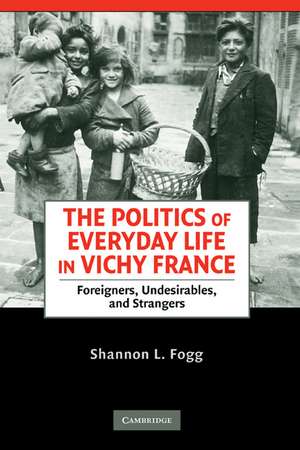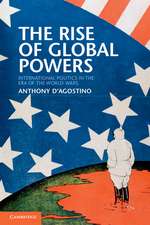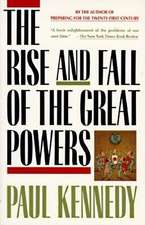The Politics of Everyday Life in Vichy France: Foreigners, Undesirables, and Strangers
Autor Shannon L. Foggen Limba Engleză Hardback – 2 noi 2008
| Toate formatele și edițiile | Preț | Express |
|---|---|---|
| Paperback (1) | 335.16 lei 43-57 zile | |
| Cambridge University Press – 13 mar 2011 | 335.16 lei 43-57 zile | |
| Hardback (1) | 693.36 lei 43-57 zile | |
| Cambridge University Press – 2 noi 2008 | 693.36 lei 43-57 zile |
Preț: 693.36 lei
Preț vechi: 779.06 lei
-11% Nou
Puncte Express: 1040
Preț estimativ în valută:
132.72€ • 144.21$ • 111.55£
132.72€ • 144.21$ • 111.55£
Carte tipărită la comandă
Livrare economică 21 aprilie-05 mai
Preluare comenzi: 021 569.72.76
Specificații
ISBN-13: 9780521899444
ISBN-10: 0521899443
Pagini: 250
Ilustrații: 5 b/w illus. 4 maps
Dimensiuni: 152 x 229 x 17 mm
Greutate: 0.5 kg
Ediția:1
Editura: Cambridge University Press
Colecția Cambridge University Press
Locul publicării:New York, United States
ISBN-10: 0521899443
Pagini: 250
Ilustrații: 5 b/w illus. 4 maps
Dimensiuni: 152 x 229 x 17 mm
Greutate: 0.5 kg
Ediția:1
Editura: Cambridge University Press
Colecția Cambridge University Press
Locul publicării:New York, United States
Cuprins
1. 'Life has never been so good': shortages, public opinion, and urban-rural interactions; 2. 'Where we are from, that is for pigs': Alsatian refugees; 3. 'They are undesirables': gypsies during World War II; 4. 'At any price': housing, the black market, and Jewish daily life; 5. 'The vast heart of mankind knows no boundaries': refuge in Jewish children's homes.
Recenzii
Reviews of the hardback: 'Social history at its best, this engaging study of daily life illuminates big political, economic and social issues. Fogg explores the complicated daily interactions of insiders and outsiders in the Limousin, a rural region in central France whose population expanded during the war to include Jewish refugees, Gypsies, refugees from war zones, and, as urban conditions worsened, city dwellers scouring the region to find food. Her insightful approach reveals how ordinary people's struggle to survive shaped their relationship with the Vichy regime.' Sarah Fishman, University of Houston
'Clearly written and persuasively argued, The Politics of Everyday Life in Vichy France offers an original and illuminating perspective on this much-studied era in French history. By focusing on two themes - the importance of material shortages and the intermingling of locals and 'outsiders' - Shannon Fogg demonstrates how the constant challenge to secure the basic necessities of life dominated many citizens' experience of Vichy and the Occupation. This challenge, as much as ideological conviction, informed how and why the rural population of the Limousin chose either to empathize with or ostracize the many communities of refugees who found themselves in their midst. By juxtaposing the experiences of Jewish and Alsatian refugees, gypsies and city-dwellers who scoured the countryside to secure essential supplies, Fogg creates a nuanced and very human portrait of daily life in Vichy France.' Martha Hanna, University of Colorado, Boulder
'An important work based on very extensive and careful research, this book explores questions of everyday survival in wartime France with great subtlety and sensitivity. It is a local study of the best kind. It has implications that extend far beyond the region studied - not least because of the attention given to 'outsiders' (refugees, Jews and nomads) for whom questions of day-to-day existence were particularly pressing. This is a book with implications for every aspect of wartime France and one that will be of interest to many scholars working on other countries too.' Richard Vinen, King's College London
'Fogg analyses the much-discussed topic of Vichy France and its treatment of outsiders through a new lens … Fogg persuasively utilizes a bottom-up view of social history by focussing on everyday interactions, primarily around food, housing, and other shortages, to provide a multifaceted portrait of social relationships in France from 1939 to 1944 … Fogg presents a motion picture of wartime dynamics rather than a snapshot …' The Journal of Interdisciplinary History
'Clearly written and persuasively argued, The Politics of Everyday Life in Vichy France offers an original and illuminating perspective on this much-studied era in French history. By focusing on two themes - the importance of material shortages and the intermingling of locals and 'outsiders' - Shannon Fogg demonstrates how the constant challenge to secure the basic necessities of life dominated many citizens' experience of Vichy and the Occupation. This challenge, as much as ideological conviction, informed how and why the rural population of the Limousin chose either to empathize with or ostracize the many communities of refugees who found themselves in their midst. By juxtaposing the experiences of Jewish and Alsatian refugees, gypsies and city-dwellers who scoured the countryside to secure essential supplies, Fogg creates a nuanced and very human portrait of daily life in Vichy France.' Martha Hanna, University of Colorado, Boulder
'An important work based on very extensive and careful research, this book explores questions of everyday survival in wartime France with great subtlety and sensitivity. It is a local study of the best kind. It has implications that extend far beyond the region studied - not least because of the attention given to 'outsiders' (refugees, Jews and nomads) for whom questions of day-to-day existence were particularly pressing. This is a book with implications for every aspect of wartime France and one that will be of interest to many scholars working on other countries too.' Richard Vinen, King's College London
'Fogg analyses the much-discussed topic of Vichy France and its treatment of outsiders through a new lens … Fogg persuasively utilizes a bottom-up view of social history by focussing on everyday interactions, primarily around food, housing, and other shortages, to provide a multifaceted portrait of social relationships in France from 1939 to 1944 … Fogg presents a motion picture of wartime dynamics rather than a snapshot …' The Journal of Interdisciplinary History
Notă biografică
Descriere
This book examines how material distress shaped the interactions of native and refugee populations as well as perceptions of the Vichy government's legitimacy.













